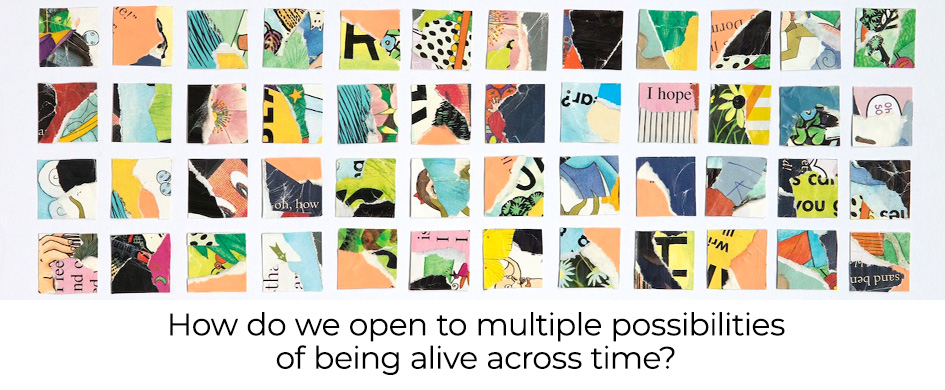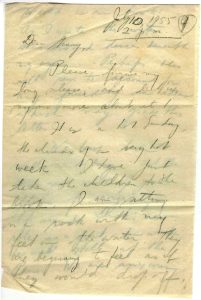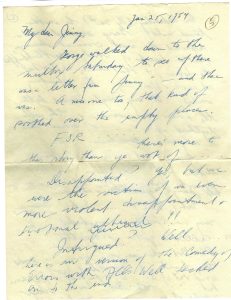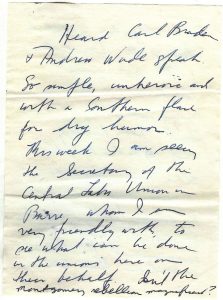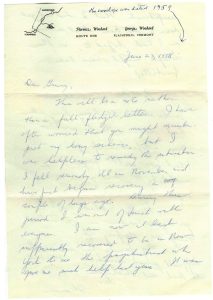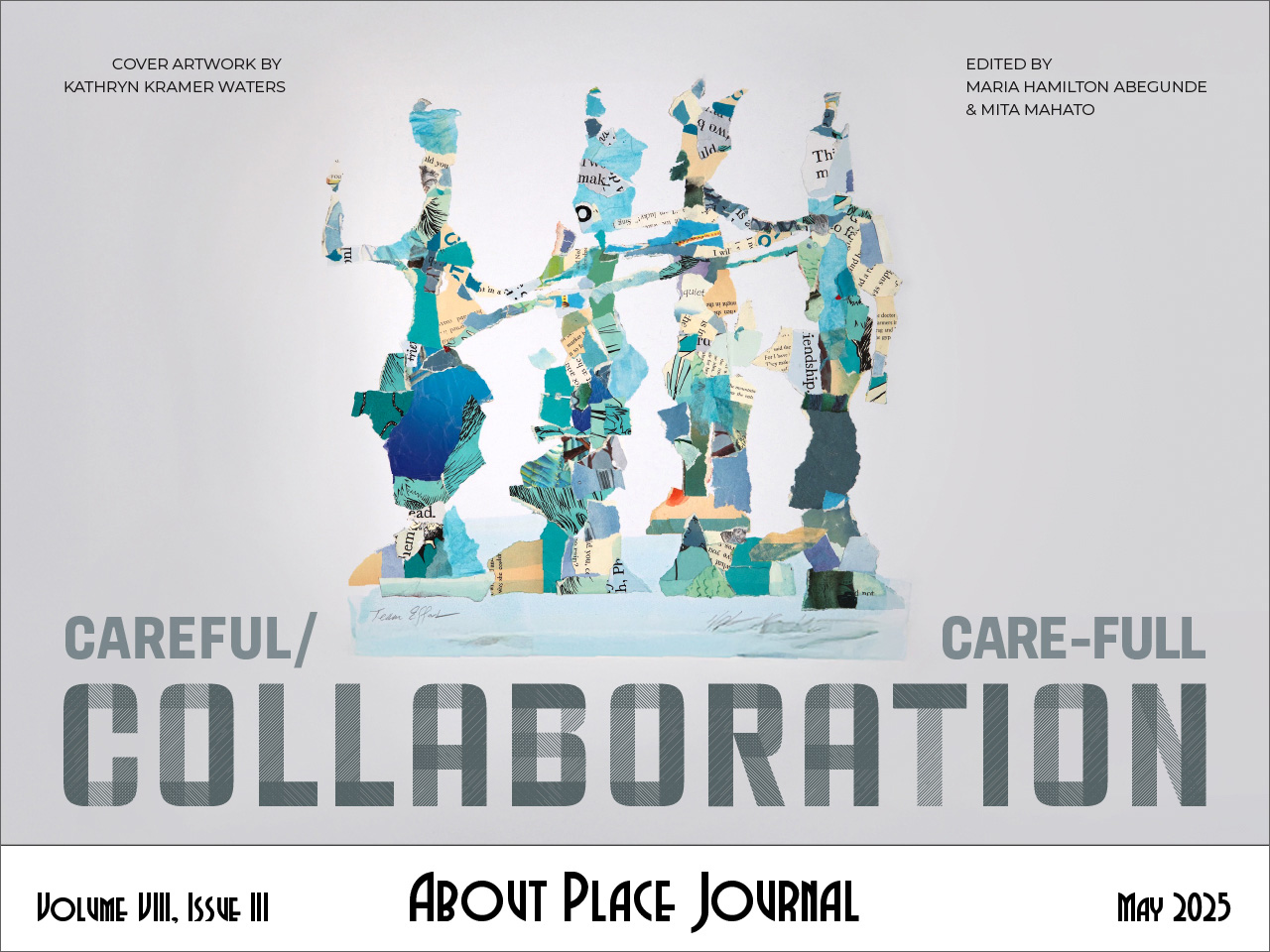July 10, 1955
2 p. m.
Dear Jinny,
Please forgive my long silence, and let us say no more about it!
It is a hot Sunday, the climax of a very hot week. I’ve just taken the children to the brook so they can splash about. I’m sitting on a rock with my feet in the water. They’re beginning to feel as if they would drop off, so cold is our brook!
As I write the water shimmers and dances beneath my eyes. Perhaps this will serve to account for any fluidity in ideas which may grace this letter.
(A pause as I take my feet out of the water—it’s positively polar!)
What are some of the things we’ve been doing? Shall I itemize?
1) We moved back early in April, after some students and George remade the kitchen. It took four days full of plaster, plaster dust, patching, wallboard and paint. Then, voila!
Kitchen has deep aqua woodwork & yellow walls & looks quite cheerful. A welcome change.
2) Sonja & Andy came up for a week to do a picture story on the nursery school. They did a magnificent job. The pictures & a short article by me to go with it will appear in the Winter issue of Vermont Life. The editors fell in love with the photos, & decided on eight pages instead of the original four.
3) My friend Lili spent a week with us in Mid-May, bringing her 2½ year old boy, Jody. She had another boy last week—Harvey. A difficult breech delivery, but both are healing. She did want a girl badly, but no doubt Harvey will make a place for himself.
4) Our car is okay.
5) Daniel is already a mechanic first class & has begun engineering lessons under the tutelage of one of George’s students. First project—design & construct a working water wheel! This was Danny’s idea. Got out of one of his favorite books, the artist Paul Klee’s Pedagogical Sketchbook.
6) Deborah is a complex child, very intense, very sociable, very jealous of Daniel’s easy charm, and so often hateful to him. But he is ever forgiving. Anyway, I coached him on the principles of infighting one day (to George’s horror), so he could get in under her longer arms and kick her down when she got mean. I believe this will improve relations!
7) George’s upcoming article for the Eugene Debs’ issue of Monthly Review is excellent. We’ll work together on choosing quotations to be scattered throughout. His article in the other issue was well received and is being talked up by his disciples in Detroit & points South & East!
Well, now you are almost caught up!
(And I submerge my feet one last time for good measure.)
A word now as to your writing. Except for the charming little poem, which I think you should try to have published in a country life magazine, it did not seem to me to be on the level of your previous work. The story on snakes has possibilities, because the subject is not too much exploited, if worked up into a children’s story; if you do this there’s a talented student here who could do marvelous illustrations for it. Then we’d try for the children’s publishers. Don’t fool with Vantage Press vanity publisher. It’s a racket!
Love to all from your cold footed
Florence
_______
“Brook”: 8½ × 11″. Handwritten in pencil. Slippery paper folded in half with a “silty” feel. Mostly legible. (click to zoom)
January 25, 1954
My dear Jinny,
Here is our version of “The Comedy of Errors” with “All’s Well” tacked to the end. Intrigued?
Well, answer one question: were you, or were you not home on Thursday evening?
End of Prologue.
[Curtain rises.]
Act I, Scene i
[George exits stage left.]
Act I, Scene ii
George heads down to the mailbox to “See if there is a letter from Jinny.” So there is, and a nice one too, that kind of soothed over the empty places, like a great tree sprouting from the gravel pit.
Act I, Scene iii
Enter George stage right, ruddy from chopping wood and repairing the most crucial damage to the pump.
The weather has turned mild and the plumbing is shored up, at least for now. We look at each other. Fire blazes on the hearth, and tea water is on. Florence’s cough seems better, and she and George think as one: telephone Jinny and tell her to come after all.
After my emotional upheaval, you shall seem like a draught of Spring Wine to him in contrast to my mildewed self!!!
Act II, Scene i
Protected by Sears Best Winter Underwear, George exits stage left to slither with car down the road only to return home crestfallen and agitated. A babysitter answered! “Oh, God, she sounded very young, and I couldn’t get a word out of her.” Florence must mask her disappointment. Her mouth readies itself below the eyes.
Florence reassures George: Jinny is very bright, you know. She can put the babysitter’s 1 + 1 together and get 4. We are all set. On Friday, at 5:30 p.m., Jinny will come on in Trailways via Burlington! George will bring home groceries and Jinny.
Secretly, however, she resolves to call Jinny the next day.
Were you, or were you not home? Did you have a babysitter? Was it a wrong number?
Act II, Scene ii
Jinny is not on the 10:10. George is agonized as he reports the failure of a mission. All the details shall be finely realized, later, like birds anchoring the corners of the sky. There’s more to this story than ye wot. Intrigue keeps its wiles to itself.
Act III, Scene i
[Next day.]
Another letter from Jinny arrives. No mention of a phone call. Florence quiets the reproving fingertips of the mind as she refolds the note. Maybe George got a wrong number, after all. If so, we shall BOMB the Tel & Tel.
[Curtain falls.]
Epilogue.
Anyway, all’s well that ends well, for my bronchitis laid me up again, and the last thing I want to be is house bound and laid up when you come. And now you will be able to stay for 3 glorious days!
Singing back, the jays are pecking lard. They share our feelings about Jinny!
Au revoir,
Florence
_______
“Babysitter Playlet”: 8½ × 11″ paper folded in half along center. Pen. Cursive. “Fire blazes on the hearth. Tea water is on.” —FW. (click to zoom)
9 a.m.
March 13, 1956
Dear Jinny,
Daniel is kneading bread so I hasten to open the communication lines, even if briefly.
My glorious month in New York at Vera’s restored my spirits completely!
A partial itinerary follows:
I called on Cliff McElroy, whom I had never known personally. So simple, unheroic, and with a Southern flare for dry humor. Heard Carl Braden and Andrew Wade speak—made me think of the cranes which lifts huge loads of Barre granite. They are spunky fighters, even though “The Brotherhood” has ganged up on them. However, I feel that they have a long way to go in achieving an objective attitude toward the Soviet Union and other socialist countries.
After supper (very good) and good talk, we travelled back to my friends, the Shernarts, in whose quartet Cliff plays a fine viola.
Also had lunch and a good conference with the editors of the American Socialist, and am commissioned to do an article on Union Education.
Finally, would like to report I saw the editors about doing a picture book based on the remarkable photographs of our Nursery School taken by Sonja and Andy. (I hear you visited them after all!) Macmillan’s is fascinated, and so far the correspondence is very hopeful.
My walks!! Behind the white capped river was space, pure and simple, an arena in which the wind could shake and howl, the sky explode with light. I’d run a fever of rapture for a few hours afterwards.
Practiced on Vera’s beautiful grand, went to concerts, exhibits, theater. Oh God, marvelous!!!
After listening to Vera’s record player, I decided my spiritual health required one of my own! My luck—a college boy was hard up and I bought his Emerson Hi-Fi for $40!! Just got it yesterday.
How are things down your way? We had a lot of shoveling—weren’t plowed out for two days after the tremendous snowstorm. But roaring towards us the last few days, the floods of spring. A grand sight like a wild free lion.
I haven’t been receiving any more of the Little Shopper News. Hope you can continue sending it. We enjoyed your characteristic anecdotes.
Love to All,
Florence
P.S. Isn’t the Montgomery rebellion magnificent!
_______
“New York Visit”: 5¼ × 8″ paper torn from a pad. Ink. Cursive. “I found once again my quaint, sage princess.” –FW. (click to zoom)
Winter, 1958
Dear Jinny,
It is only in the last couple of days that I am sufficiently recovered to explain my long silence in some fashion. My affection for you is steadfast! You gave me so much help. Yet, I suffered from an inability to send off an envelope, let alone call or get to New Hampshire to talk. I have been seriously ill since November. Never enough breath, but the birches breathed easily. I thought of the weeping willow mother stump you described so well. And the business of choosing cloth from the bolts you have frequently described. Deborah and I are major beneficiaries!
I am now in New York to see the psychiatrist. My instincts were awry. Perhaps I had been drawn too far inland. I was resolved to fit in with the crows. They had some proprietary stake. The cat on the chair kept me company. There are worse places to spend one’s day than in one’s room.
Last November, the winds so brisk, the white spores in the fields. It was a haunting interchange, even washing dishes. What would you like to know? There is nothing to know. When the reporters hurried to interview the strike leader, they had to wait. Kate Debs didn’t believe in being interviewed in an apron, any more than her husband would think of appearing in the union hall in overalls.
We move on. The weather has turned mild and fine. My family has weathered the crude elemental beginning of our year, somehow.
My best to Dick and the children.
Love,
Florence
_______
“Last letter”: Ink. Cursive. 7¼ × 10½″. Letterhead stationary of Florence and George Woodard, including small map in upper left-hand corner of location of house off highway between Plainfield and Marshfield, VT. Added in another hand: Envelope dated 1959. “Shortly I shall write to your again.” —FW. (click to zoom)
Can one collaborate with the dead, with a singled-out dead person, in this case my mother, Florence Woodard, who died when I was ten, meaning that there were many conversations with her I missed out on? Is it possible to have a conversation by way of artifacts, in this case my mother’s letters to a close friend, Jinny Colter? In the early 1950s, my mother, Florence, moved from New York City to a farmhouse in rural Vermont, though ultimately she missed city life. Her friend Jinny made an easier transition from Newark, New Jersey to the rigors of country living in New Hampshire. Each had married and each had two children. They offered one another emotional support through their exchange.
Here, I’ve collaged, condensed, and often augmented my mother’s letters, creating a hybrid document in which my own sensibility melds with hers. My collaged mends may be visible—mended china’s hairline cracks apparent to me (and perhaps to others?). Yet, more eerily, they often disappear. Some of the additions are imagistic. Others extend a moment to intensify my sense of my mother’s personality in action. I feel her exuberance in the “New York City Letter,” for instance. By restructuring the text, however slightly, I share that flood of urban energy. In her “Last Letter,” I sense desolation, but it’s also my own desolation because I know what’s coming. Recently, I realized that I’d changed the letter’s date to winter. Knowing the outcome of her illness, I likely superimposed her actual death, which came in winter. The letter is sad, but marked by the determination to pursue life.
As the collaboration accretes (included above are selections from a larger swatch), I seek a narrative of my early life and my mother’s final years. And I get to write with her.

